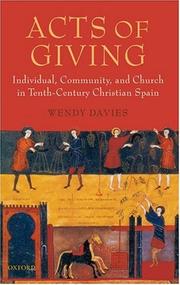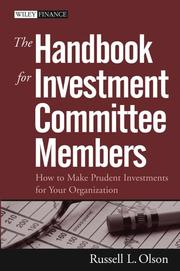| Listing 1 - 10 of 40 | << page >> |
Sort by
|

ISBN: 0742544737 Year: 2005 Publisher: Lanham, Maryland Rowman & Littlefield Publishers, Inc.
Abstract | Keywords | Export | Availability | Bookmark
 Loading...
Loading...Choose an application
- Reference Manager
- EndNote
- RefWorks (Direct export to RefWorks)
Book
ISBN: 3110966999 9783110966992 9783598222528 Year: 2015 Publisher: Berlin Boston
Abstract | Keywords | Export | Availability | Bookmark
 Loading...
Loading...Choose an application
- Reference Manager
- EndNote
- RefWorks (Direct export to RefWorks)
Endowments --- Charitable foundations --- Charitable trusts --- Donations --- Educational endowments --- Endowed charities --- Foundations (Endowments) --- Philanthropy --- Private foundations --- School endowments --- Education and state --- Charities
Book
ISBN: 3050041595 1306486602 3050048484 9783050041599 Year: 2005 Volume: 4 Publisher: Berlin Akademie Verlag
Abstract | Keywords | Export | Availability | Bookmark
 Loading...
Loading...Choose an application
- Reference Manager
- EndNote
- RefWorks (Direct export to RefWorks)
Stiftungen sind ein Phänomen der Universalgeschichte. In der jüngeren deutschen Mediävistik wird anstelle des früher gebräuchlichen, oft anachronistischen und historisch zu wenig flexiblen juristischen mit einem sozial- und kulturwissenschaftlichen Deutungsansatz gearbeitet. Auf der Berliner Tagung vom Juni 2003 wurde der Versuch gemacht zu überprüfen, ob und inwiefern diese Charakteristik der Stiftung, die auf Studien vornehmlich zum ";abendländischen"; (lateinischen) Stiftungswesen beruht, auch auf andere Kulturen anwendbar ist.
Charity --- Endowments --- Gifts --- Religious aspects --- History. --- Religious aspects. --- History --- Charitable foundations --- Charitable trusts --- Donations --- Educational endowments --- Endowed charities --- Foundations (Endowments) --- Philanthropy --- Private foundations --- School endowments --- Education and state --- Charities

ISBN: 0262271893 9780585379971 0585379971 9780585379975 9780262271899 9780262041898 Year: 2001 Publisher: Cambridge, Mass. ; London : MIT,
Abstract | Keywords | Export | Availability | Bookmark
 Loading...
Loading...Choose an application
- Reference Manager
- EndNote
- RefWorks (Direct export to RefWorks)
In American Foundations , Mark Dowie argues that organized philanthropy is on the verge of an evolutionary shift that will transform America's nearly 50,000 foundations from covert arbiters of knowledge and culture to overt mediators of public policy and aggressive creators of new orthodoxy. He questions the wisdom of placing so much power at the disposal of nondemocratic institutions. As American wealth expands, old foundations such as Ford, Carnegie, Rockefeller, Pew, and MacArthur have grown exponentially, while newer trusts such as Mott, Johnson, Packard, Kellogg, Hughes, Annenberg, Hewlett, Duke, and Gates have surpassed them. Foundation assets now total close to $400 billion. Though this is a tiny sum compared to corporate and government treasuries, and foundation grants still total less than 10 percent of contributions made by individuals, foundations have power and influence far beyond their wealth. Their influence derives from the conditional nature of their grant making, their power from its leverage. Unlike previous historians of philanthropy who have focused primarily on the grant maker, Dowie examines foundations from the public's perspective. He focuses on eight key areas in which foundations operate: education, science, health, environment, food, energy, art, and human services. He also looks at their imagination, or lack thereof, and at the strained relationship between American foundations and American democracy. Dowie believes that foundations deserve to exist and that they can assume an increasingly vital role in American society, but only if they transform themselves from private to essentially public institutions. The reforms he proposes to make foundations more responsive to pressing social problems and more accountable to the public will almost certainly start an important national debate.
Endowments --- Charities --- History. --- Charitable foundations --- Charitable trusts --- Donations --- Educational endowments --- Endowed charities --- Foundations (Endowments) --- Philanthropy --- Private foundations --- School endowments --- Education and state --- SOCIAL SCIENCES/Political Science/Public Policy & Law

ISBN: 1281154008 9786611154004 0191536210 9780191536212 9781281154002 6611154000 0199283400 9780199283408 1383042918 Year: 2007 Publisher: Oxford ; New York : Oxford University Press,
Abstract | Keywords | Export | Availability | Bookmark
 Loading...
Loading...Choose an application
- Reference Manager
- EndNote
- RefWorks (Direct export to RefWorks)
'Acts of Giving' examines issues surrounding donation - the giving of property, particularly landed property - in northern 'Christian' Spain during the 10th century, a time when written texts were starting to become plentiful and which now give us a valuable insight into the workings of that society.
Endowments --- Gifts --- Donations --- Presents --- Generosity --- Manners and customs --- Free material --- Charitable foundations --- Charitable trusts --- Educational endowments --- Endowed charities --- Foundations (Endowments) --- Philanthropy --- Private foundations --- School endowments --- Education and state --- Charities --- History --- Spain --- Social life and customs. --- Church history.

ISBN: 0511896875 052125986X 0521088674 Year: 1985 Publisher: Cambridge : Cambridge University Press,
Abstract | Keywords | Export | Availability | Bookmark
 Loading...
Loading...Choose an application
- Reference Manager
- EndNote
- RefWorks (Direct export to RefWorks)
Dr Kozlowski's important study pioneers a fresh approach to the study of a critical Muslim institution: the endowments or awqaf which almost everywhere in the Islamic world provide support for mosques, schools and shrines. The wealthier Muslims who establish endowments inevitably have an eye on social, political and economic conditions and have traditionally used awqaf as part of an effort to preserve their wealth and influence, especially in periods of change and uncertainty. The book focuses on the use of endowments by Muslims suffering the dislocations caused by the imposition of British rule in India and examines in detail the social and political implications of the controversy over endowments that took place in the imperial courts and councils. The author's observations and insights can be applied to many periods and places in the Muslim world and his novel approach will attract all those interested in the study of Islam.
Waqf --- Endowments --- Charitable foundations --- Charitable trusts --- Donations --- Educational endowments --- Endowed charities --- Foundations (Endowments) --- Philanthropy --- Private foundations --- School endowments --- Education and state --- Charities --- Awqāf --- Evkaf --- Vaqf --- Vkaf --- Wakf --- Islamic law --- Law and legislation --- Social Sciences --- Sociology
Book
ISBN: 388353028X Year: 1986 Publisher: Marburg an der Lahn Marburger Geographisches Gesellschaft
Abstract | Keywords | Export | Availability | Bookmark
 Loading...
Loading...Choose an application
- Reference Manager
- EndNote
- RefWorks (Direct export to RefWorks)
Endowments --- Islam --- Religious trusts --- History --- Charities --- -Islam --- -Religious trusts --- -Religious uses --- Trusts, Religious --- Charitable uses, trusts, and foundations --- Mortmain --- Mohammedanism --- Muhammadanism --- Muslimism --- Mussulmanism --- Religions --- Muslims --- Charitable foundations --- Charitable trusts --- Donations --- Educational endowments --- Endowed charities --- Foundations (Endowments) --- Philanthropy --- Private foundations --- School endowments --- Education and state --- -Charities --- -History --- -Endowments --- Religious uses

ISBN: 0471719781 1118161017 9786610255108 1280255102 0471724971 9780471724971 9780471719786 9781280255106 Year: 2005 Publisher: Hoboken, N.J. : Wiley,
Abstract | Keywords | Export | Availability | Bookmark
 Loading...
Loading...Choose an application
- Reference Manager
- EndNote
- RefWorks (Direct export to RefWorks)
Comprehensive coverage of what it takes to be a responsible member of an investment committeeIn a clear, organized, and easy-to-understand manner, this handbook explains the responsibilities and expectations of investment committee fiduciaries for pension funds, endowment funds, and foundations. Emphasizing all the do's and don'ts to follow for prudent investment management, this invaluable resource covers topics ranging from investment policy, asset allocation, and risk assessment to understanding information presented at committee meetings, asking meaningful and productive questions,
Endowments - Finance. --- Institutional investments. --- Investments. --- Pension trusts - Investments. --- Institutional investments --- Investments --- Pension trusts --- Endowments --- Finance --- Finance. --- Charitable foundations --- Charitable trusts --- Donations --- Educational endowments --- Endowed charities --- Foundations (Endowments) --- Philanthropy --- Private foundations --- School endowments --- Pension trust investments --- Education and state --- Charities --- Global custody (Securities) --- E-books
Book

ISBN: 9783110416480 3110416484 9783110417708 3110417707 9783110417760 3110417766 9783050064765 3050064765 9783050064772 3050064773 3110401274 3110401266 9783110425802 Year: 2014 Publisher: Berlin : De Gruyter,
Abstract | Keywords | Export | Availability | Bookmark
 Loading...
Loading...Choose an application
- Reference Manager
- EndNote
- RefWorks (Direct export to RefWorks)
Stiftungen sind ein universales Phänomen entwickelter Gesellschaften von Babylon und Ägypten bis zur Gegenwart. Obwohl die Verwandtschaft der Zeugnisse und Belege über mehrere Jahrtausende längst erkannt ist, gibt es bisher keinen systematischen Vergleich für einen begrenzten Zeitraum, aber in globaler Weite, und deshalb auch keine sicheren Erkenntnisse über interkulturelle Wechselbeziehungen, Neuerfindungen und besonderen Ausprägungen. In dieser Enzyklopädie wird für das Jahrtausend von ca. 500-1500 zum ersten Mal der Versuch zu einer parallelen Erschließung des Stiftungswesens in fünf religiös geprägten Kulturen gemacht. Alle Themen werden von je einem Experten für das lateinische und griechisch-orthodoxe Christentum, für das Judentum, den Islam und die brahmanische, hinduistische, jainistische und buddhistische Welt Indiens behandelt, so dass die jeweiligen Ergebnisse in einen interkulturellen Vergleich eingehen können. Der zweite Band betrifft das „soziale System Stiftung“ und behandelt die Zwecke (religiöses Verdienst, weltliche Ambitionen; Gedenken und Kultus; Wohltätigkeit und Bildung), die Wirtschaft (Vermögen und Erträge) und die Akteure (Stifter; Stiftungsbegünstigte und Stiftungsorganisatoren). The second volume of this intercultural comparative encyclopedia is devoted to the actors behind ‘medieval’ foundations in Latin Europe, Byzantium, the Islamic lands, Judaism, and the multi-religious world of India. Individual chapters address religious merits and worldly ambitions, remembrance and cults, charity and education, foundation assets and profits, donors, beneficiaries of foundations, and the organization of foundations.
Geschichte 500-1500 --- Enzyklopädie --- Féodalité --- Endowments --- History --- Social systems. --- Sociology. --- Social theory --- Social sciences --- Sociology --- System theory --- Féodalité --- Charitable foundations --- Charitable trusts --- Donations --- Educational endowments --- Endowed charities --- Foundations (Endowments) --- Philanthropy --- Private foundations --- School endowments --- Education and state --- Charities --- Foundations. --- cross-cultural comparisons. --- encyclopedia. --- endowments.
Book
ISBN: 0198716435 1283643901 0191634077 9780191634079 Year: 2012 Publisher: Oxford : Oxford University Press,
Abstract | Keywords | Export | Availability | Bookmark
 Loading...
Loading...Choose an application
- Reference Manager
- EndNote
- RefWorks (Direct export to RefWorks)
Elites play a crucial role in the development process. The impact they have on growth and development exceeds their representation within a country. This volume uses case studies from South Africa to China to seek an understanding of the relationship between elites and economic development.
Elite (Social sciences) --- Endowments. --- Power (Social sciences) --- Attitudes. --- Empowerment (Social sciences) --- Political power --- Exchange theory (Sociology) --- Political science --- Social sciences --- Sociology --- Consensus (Social sciences) --- Charitable foundations --- Charitable trusts --- Donations --- Educational endowments --- Endowed charities --- Foundations (Endowments) --- Philanthropy --- Private foundations --- School endowments --- Education and state --- Charities --- Development economics --- Elites (Social sciences) --- Leadership --- Social classes --- Social groups --- Economics --- Economic development --- Social aspects --- Economic conditions --- E-books
| Listing 1 - 10 of 40 | << page >> |
Sort by
|

 Search
Search Feedback
Feedback About UniCat
About UniCat  Help
Help News
News